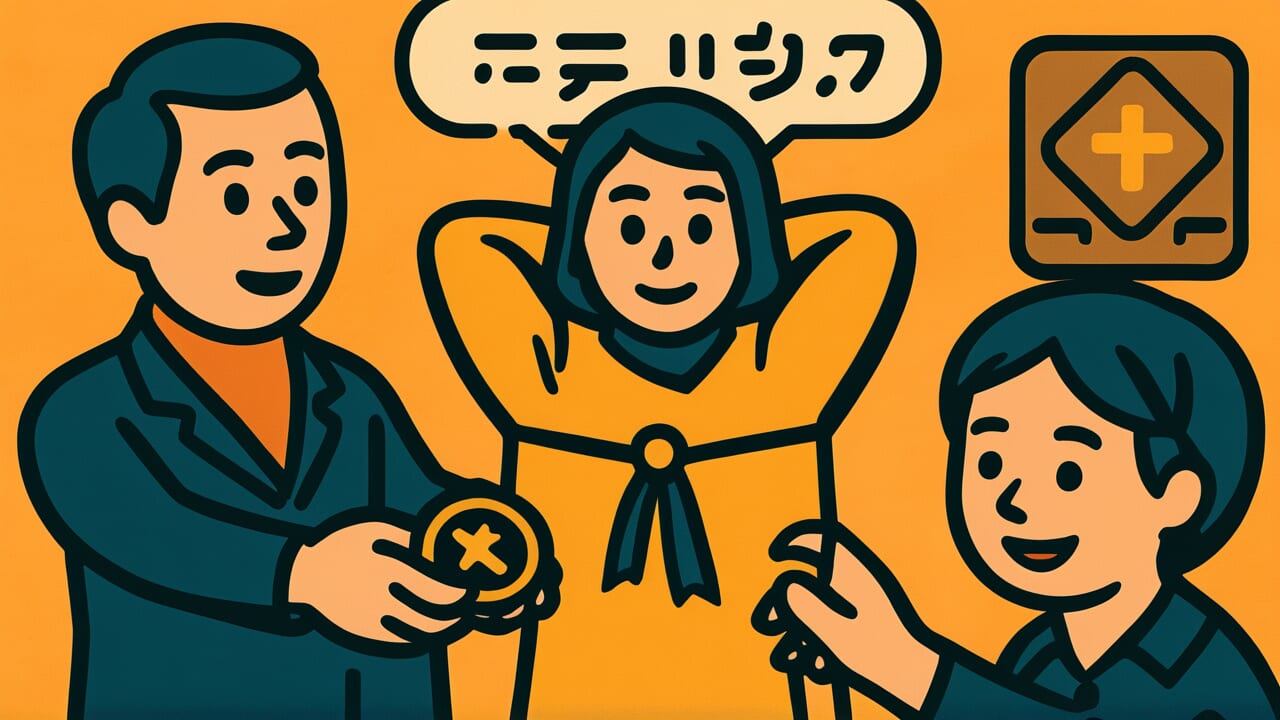How to Read “Good deeds bring good rewards, evil deeds bring evil rewards”
Zen ni wa zen no mukui, aku ni wa aku no mukui
Meaning of “Good deeds bring good rewards, evil deeds bring evil rewards”
This proverb shows the cause-and-effect relationship between actions and results. If you do good things, good results will come back to you. If you do bad things, bad results will come back to you.
This isn’t just wishful thinking. It expresses a firm belief that an invisible moral order exists in the world. This order ultimately brings fair results to everyone.
People use this proverb when they want to encourage someone to do the right thing. They also use it to warn against wrongdoing. It can comfort people who have suffered unfairly too.
The saying gives hope with this message: “Even if things are hard now, your good deeds will surely be rewarded someday.”
Even today, this idea supports many people’s hearts. The belief that doing the right thing will lead to good results gives people strength. It helps them live honestly even in difficult situations.
Origin and Etymology
It’s difficult to pinpoint the exact origin of this proverb. However, Buddhist teachings about cause and effect deeply influence its foundation. Buddhism teaches the law of karma: good actions bring good results, and bad actions bring bad results.
The word “mukui” (reward) itself is interesting. It doesn’t just mean a result. It includes the concept of response and circulation. Your actions go around and eventually come back to you.
In Japan, people have long believed that an invisible moral order governs the world.
The structure of this proverb is also noteworthy. The parallel expression “good to good” and “evil to evil” represents a balanced universal law. By placing good and evil side by side, it shows a universal truth.
Every action, not just one side, brings corresponding results.
During the Edo period, this idea of cause and effect became central to moral education for common people. Most moral stories taught at temple schools followed the same pattern. Good deeds led to happiness, and bad deeds led to misfortune.
Through this education, the proverb became established as the foundation of Japanese moral values.
Usage Examples
- He steadily continued helping others, so good deeds bring good rewards—that’s why he’s successful now
- Even if you profit through dishonest means, good deeds bring good rewards, evil deeds bring evil rewards, so payback will surely come someday
Universal Wisdom
This proverb has been passed down for hundreds of years. It reflects humanity’s fundamental thirst for justice. We all want the world to be fair. Good people should be rewarded, and bad people should be punished.
We know in our heads that the world isn’t that simple. But deep in our hearts, we want to believe “it should be that way.”
When we look at human society, we see unreasonable things everywhere. Sometimes honest people suffer losses. Sometimes cunning people gain advantages. But that’s exactly why people cling to this proverb.
Even if results aren’t immediately visible, the belief that things balance out in the long run gives hope. It might be human wisdom for finding hope in despair.
What’s interesting is that this proverb isn’t just a wish. It’s also a warning. The part about “evil deeds bring evil rewards” cautions wrongdoers. Even when no one is watching, heaven is watching.
By believing this, people have disciplined their own behavior.
In other words, this proverb served as a device supporting human morality. By believing in rewards, people choose good and avoid evil. This accumulation has maintained social order.
When AI Hears This
In the 1980s, political scientist Axelrod conducted an experiment with surprising results. He gathered complex strategy programs designed by experts worldwide. He made them compete against each other on computers.
The simplest strategy called “tit for tat” won. This program had only two rules. First, cooperate. After that, copy exactly what your opponent did last time.
If the opponent cooperates, you cooperate. If they betray, you betray back.
Why is this strategy so strong? Consider a situation called the prisoner’s dilemma. If two people cooperate, both gain benefits. If only one betrays, the betrayer gets maximum benefit.
But if both betray, both lose. In a one-time game, betrayal pays off. But in repeated games, the story changes.
The tit-for-tat strategy keeps responding to goodwill with goodwill, so cooperation continues. It immediately retaliates against malice, so opponents gain no benefit from betrayal.
More importantly, this strategy is evolutionarily stable. When more people in a group use tit-for-tat, betrayers can’t profit and get eliminated. Meanwhile, overly nice strategies also disappear because betrayers exploit them.
Mathematical calculations show something clear. In long-term interactions, the balance of “return good for good, evil for evil” survives best. This proverb captures a truth that human society discovered over thousands of years.
Computers proved it in just a few hours.
Lessons for Today
This proverb teaches us not to choose actions based only on immediate gains and losses. Attacking someone on social media might relieve stress temporarily. But those words remain forever in the digital ocean.
Someday they might damage your own reputation.
On the other hand, being kind when no one is watching, keeping promises, doing careful work—these small good deeds accumulate. They build your credibility as a person.
It’s like invisible savings. It comes back as human relationships that help you when you’re truly in trouble.
What matters is not doing good expecting rewards. Choose to do good for its own sake. Believe that results will follow. Living honestly this way ultimately protects you.
Your small choices today create tomorrow’s you. Have the courage to keep choosing good. That accumulation will surely enrich your life.



Comments